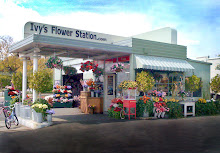edible Los angeles
Grand Opening of the Kenneth Village Farmers' Market: July 3, 2009
By Kathy Kottaras http://www.ediblelosangeles.com/
In my father’s hometown in Greece, Tripoli, farmers from all over the countryside gather every Saturday in the largest platia, or square, to sell their freshest goods. As a child visiting from Chicago where the closest we got to the farm was Indiana, I was enchanted by the exoticism of a farmers’ market, with its vendors, wrinkled and wrapped in scarves, selling heaps of tomatoes, unusual squash, and dried, fragrant herbs. With bags heavy, it took us hours to traverse the six rows, for every few feet, we would stumble upon a cousin or neighbor or friend. The market in Tripoli was an event – its spirit not just one of shopping, but of experiencing life as a community, as a village. Imagine my delight to discover that Glendale’s Kenneth Village, the closest thing I’m going to get to a platia here in LA, was starting a farmers’ market.
Marianne Atkinson, owner of Ivy’s Flower Station, shedding tears of joy, standing with Laura Friedman, City Councilmember
Marianne Atkinson, owner of Ivy’s Flower Station, shedding tears of joy, standing with Laura Friedman, City Councilmember
July 3rd marked the first farmers’ market in Kenneth Village, held in a parking lot owned by Jay and Anne Greer of The Greer Building Company.
Although there had been talk of having a market in Kenneth Village for more than eight years, Scholastic Gardens worked with the city and the Kenneth Village Merchants’ Association to make the market become a reality in only four months. While the majority of the merchants voted in support, a few, including Sarkis Militonyan, owner of the Kenneth Village Meat Market, vehemently opposed the market, expressing serious concerns about unwanted congestion and impending competition. “This concern is understandable to us, especially in this economy,” says Claire Headley, Operations Manager of Scholastic Gardens. Happily, after walking the first market on Friday and witnessing its success, Miltonyan joined more than 300 other people by signing a petition to ask the City Council to waive a variance on the zoning so that the market can become a weekly event.
The grand opening was conducted by City Councilmember Laura Friedman, who cut the ribbon to a arch of balloons that welcomed market-goers to the festivities. The air was filled with the fragrance of teriyaki chicken on the grill and the infectious rhythms of steel drums of the Pan-A-Cea Calypso Band.
Scholastic Gardens organized the main section, which included four certified produce vendors, two of those organic and pesticide free, three hot food vendors, two skin care merchants, and an organic gardening stand.
Marianne Atkinson, owner of Ivy’s Flower Station, which stands adjacent to the market, opened her lot so local businesses like Audrey K. and Pet Rush could join the party and sell their goods. Miltonyan is scheduled to join them this week. As Headley explains, Atkinson allowed them to set up a “workable solution” between the Village merchants and the market. “They don’t pay us but are part of the event.” Indeed, this market was a community event, much like the one in Greece. The Glendale Police Deparment’s K-9 unit opened their squad car for children to pet a service dog. I was among friends, as my peeps (did I just say peeps?) from our local MOMS Club chapter joined the mix. As Headley explains, the beauty of a farmers’ market is that it “brings the community together.” At this point, however, the market is still small and faces steep competition from other local markets like those on Saturday in Burbank and on Sunday in Montrose, where you can buy from over a dozen produce vendors and even purchase grass-fed beef, seafood, and cheese. I was pleasantly surprised to see farm fresh eggs from local Tehacapi and certified organic fruit. In fact, between the four produce vendors, I was able to get my week’s shopping done, and still have time to mingle. Also, I like knowing that Scholastic Gardens will be using money from the market to projects in the local schools. As Headley explains, a market can only be operated by a non-profit organization, a government agency or an agriculture producer. The idea is to “bring the farmers to the consumer and cut out the middle man. Headley says, “it’s important to support the small farmers. If it wasn’t for the farmer’s markets, the small farmers’ would be long gone.” I think the same can be said for sleepy streets like Kenneth Village. Farmers’ markets bring well-needed foot traffic to businesses struggling to stay afloat. She also acknowledges that it can take anywhere from one to three years for a farmers’ market to become an event that people incorporate into their weekly schedule. “However, we certainly had a great start. It will be a great thing to get Kenneth Village on the map.”
0 Comments:
Subscribe to:
Post Comments (Atom)

